Harrogate Town
Formed 1919
Promoted to League Two 2020
Kit History
Harrogate AFC
1919
Club disbanded 1932
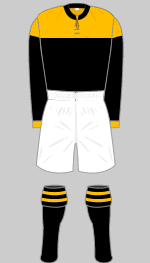
1919-1920 f
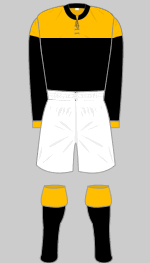
1920-1922 e f

1922-1924
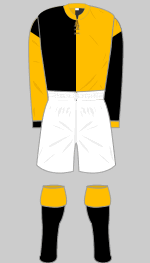
1924-1932 e f
Harrogate Hotspurs
1935
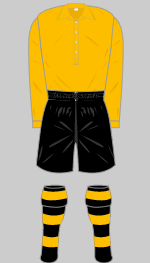
1935-1948 e f
Harrogate Town
1948
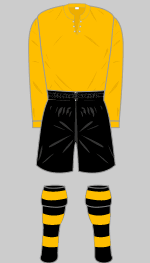
1949-1950 f

1950-1953
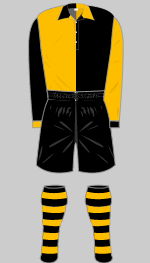
1953-1954 f
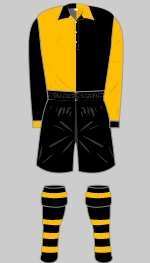
1954-1955 f
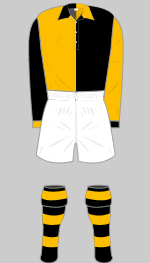
1956-1957 a f
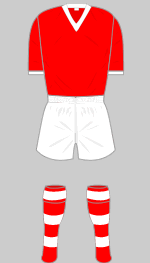
1957-1964 e f
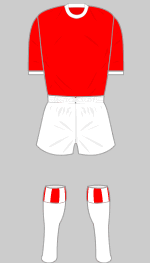
1964-1965 e f
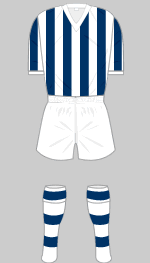
1967-1968 e f
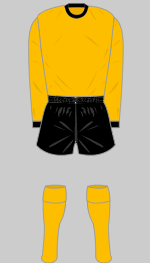
1969-1970 f

1970-1972
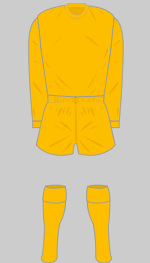
1972-1973 e f

1973-1975
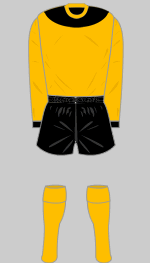
1975-1976 e f
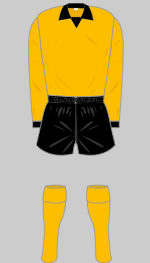
1976-1977 e f
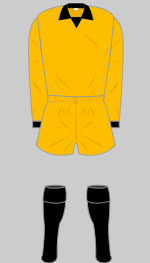
1977-1978 f
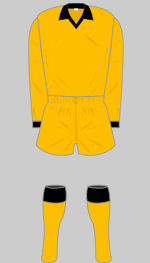
1978-1979 f
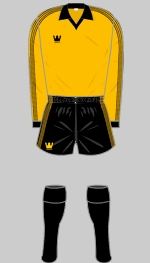
1979-1981 e f
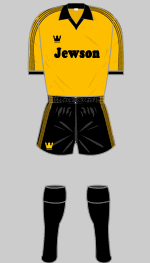
1981-1982 e f
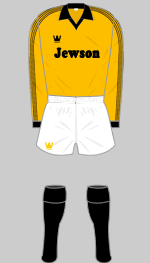
1982-1983

1984-1986 b e f
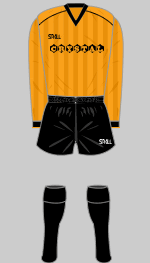
1986-1987 e f
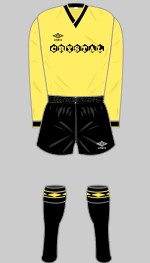
1987-1988 b f
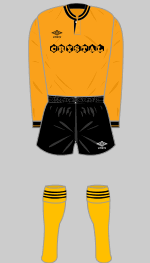
1988-1990 b f
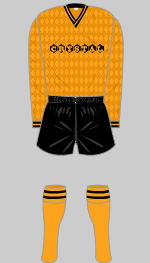
1991-1992 b f
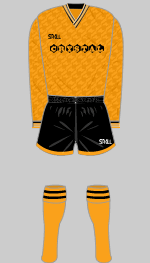
1992-1993 b f

1993-1994
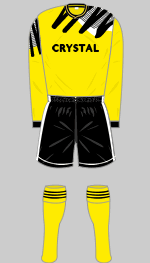
1994-1996 f
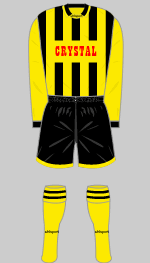
1996-1997 b e f
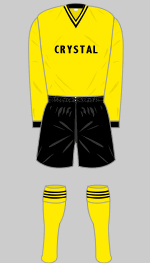
1998-1999 e f
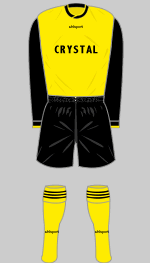
1999-2000 b
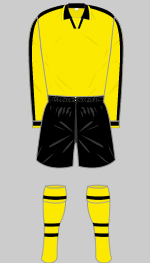
2000-2001 b
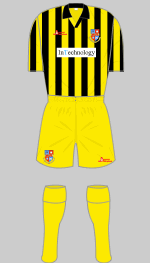
2001-2002 a b c
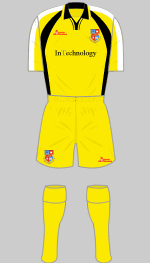
2002-2003 e
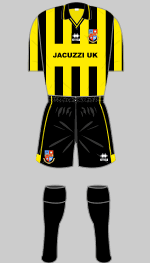
2003-2005 b e
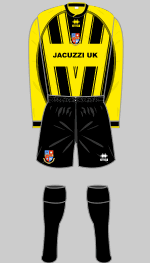
2005-2006 b
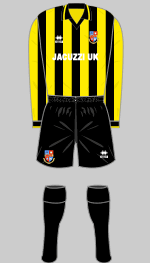
2006-2007 e
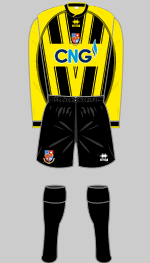
2007-2008 b e
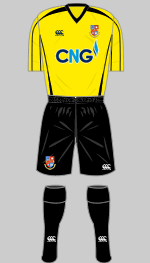
2008-2009 b e
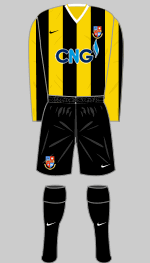
2009-2010 b c
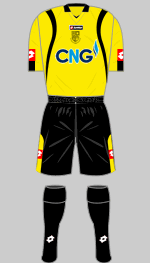
2010-2011 e
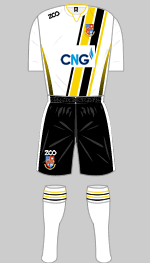
2011-2012 e
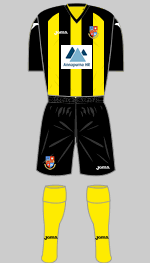
2012-2014 b
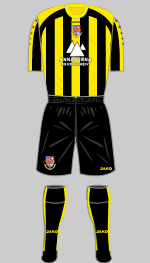
2014-2017 b
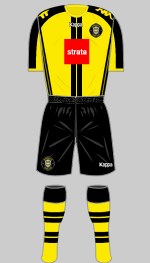
2017-2019 b
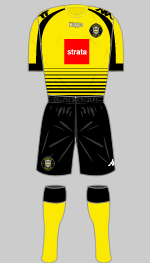
2019-2020 d
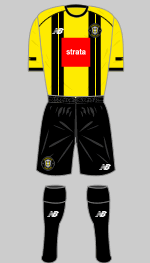
2020-2021 d
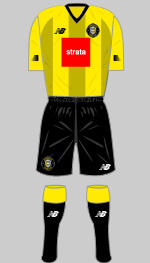
2021-2023 d
Background
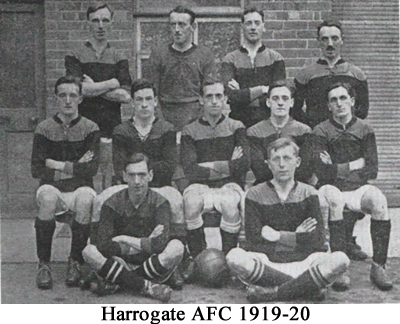 Harrogate AFC was actually constituted at the start of the 1914-15 season but their first fixture, away to Bishop Auckland on 5 September 1914 was called off at the last minute after the majority of Harrogate's team joined up following the outbreak of war.
Harrogate AFC was actually constituted at the start of the 1914-15 season but their first fixture, away to Bishop Auckland on 5 September 1914 was called off at the last minute after the majority of Harrogate's team joined up following the outbreak of war.
The club was re-formed in 1919 and joined the West Riding League. Their registered colours were amber and black and they were known as The Sulphurites. (Harrogate is a spa town whose medicinal waters are rich in sulphur which also happens to be yellow.) The following season they stepped up to the newly formed Yorkshire League and moved into their present ground at Wetherby Lane (now Wetherby Road). They continued to field a reserve team in the West Riding League. In 1925 the team won their first senior honour, the West Riding County Challenge Cup. They won the Yorkshire League championship in 1927 but at the end of the 1931-32 season the club disbanded for lack of funds and support.
In 1935 a new club known as Harrogate Hotspurs was formed, fielding sides in the Harrogate League and the West Riding County Amateur League. When the Second World War broke out, the Hotspurs joined the West Yorkshire League.
In 1948 the club changed its name to Harrogate Town to better reflect their status as the town's premier club and in 1957 they joined the Yorkshire League.
After two decades of modest achievement they became founder members of the Northern Counties East League and began a programme of ground improvements starting with the installation of floodlights in 1982. Five years later Harrogate joined the Northern Premier League and in 1990 the club finally became a limited company in order to raise funds to build a new main stand.
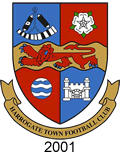 The 2001-02 season was a turning point. After 15 years in the NPL (now the Unibond League) First Division, Harrogate won the title with ten points to spare and promotion to the Unibond Premier Division. Fittingly a crest, based on the Harrogate coat of arms, was worn for the first time during this campaign.
The 2001-02 season was a turning point. After 15 years in the NPL (now the Unibond League) First Division, Harrogate won the title with ten points to spare and promotion to the Unibond Premier Division. Fittingly a crest, based on the Harrogate coat of arms, was worn for the first time during this campaign.
Two seasons later Harrogate earned a place in the newly formed Conference North. in 2010 they finished last and were due to be relegated but were handed a reprieve when Northwich Victoria were demoted for breaching the Conference's financial regulations. Relegation loomed again at the end of 2011-12 but they were saved on the final day thanks to a 5-0 win at Corby Town.
In 2017, after a long run of poor form, the board announced that the club would go fully professional. This 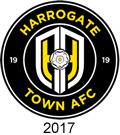 led to a clear out of part-timers who were replaced by new signings. Success followed and in May 2018 they won the Conference North play-offs. The rebranding exercise extended to a smart new crest that reflected the club's yellow and black colours and (this being Yorkshire) a white rose.
led to a clear out of part-timers who were replaced by new signings. Success followed and in May 2018 they won the Conference North play-offs. The rebranding exercise extended to a smart new crest that reflected the club's yellow and black colours and (this being Yorkshire) a white rose.
Harrogate reached the National League play-offs in 2019 but were eliminated by AFC Fylde. The following season was cut short by the Covid-19 pandemic with Harrogate finishing second on points-per-game which meant they entered the play-offs at the semi-final stage. After beating Boreham Wood they defeated Notts County 3-1 behind closed doors at Wembley Stadium to earn promotion to the English Football League.
Sources
- (a) The History of Harrogate Town AFC
- (b) Michael Gluck
- (c) Old Football Shirts
- (d) Harrogate Town AFC Official Website
- (e) Sam Walsh
- (f) Phil Harrison (Official Club Historian)
Photograph Phil Harrison, Official Harrogate Town Historian.